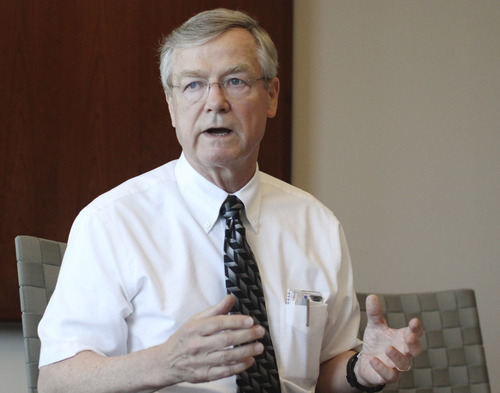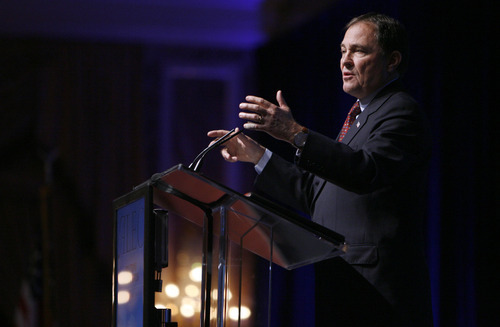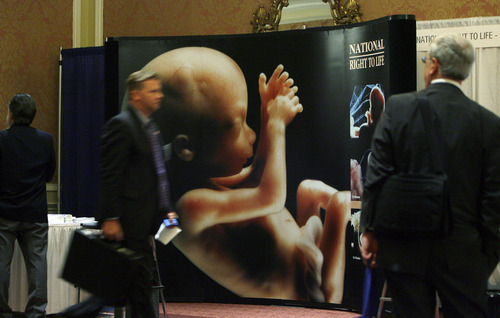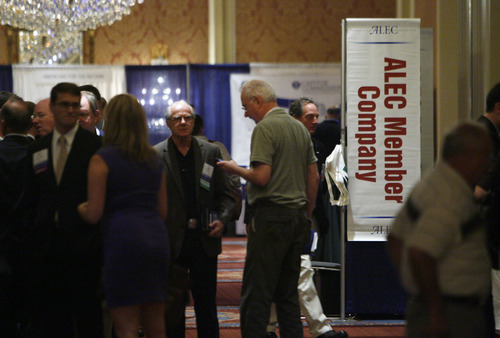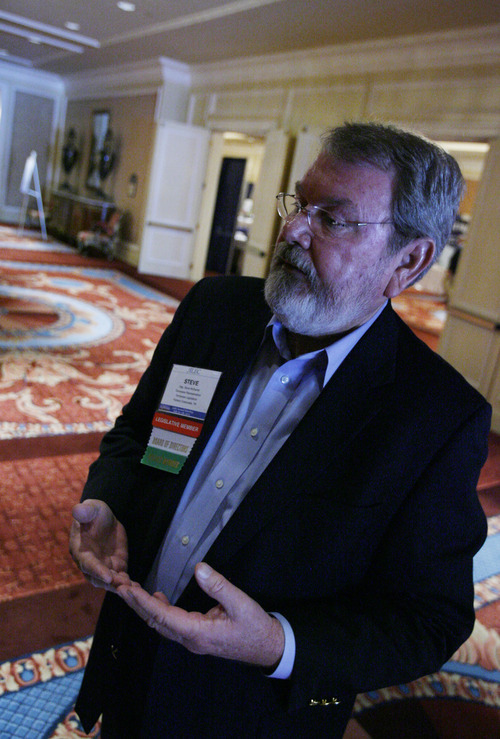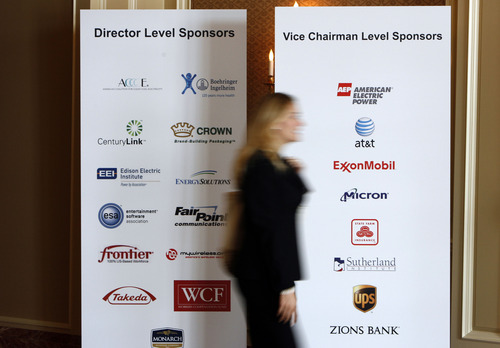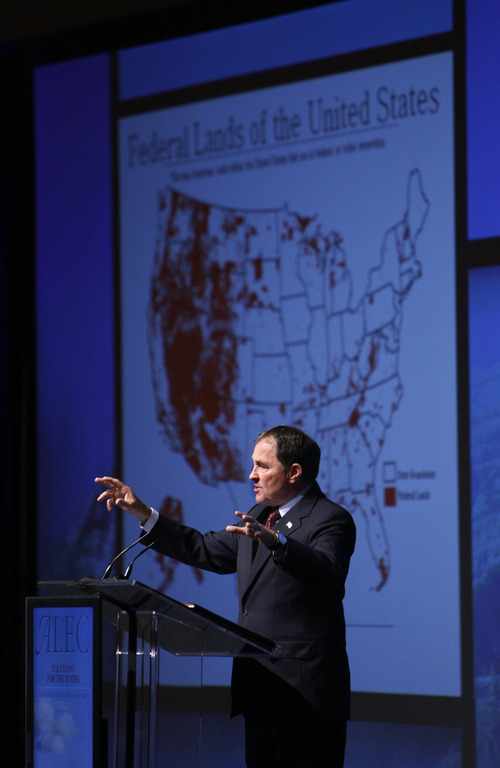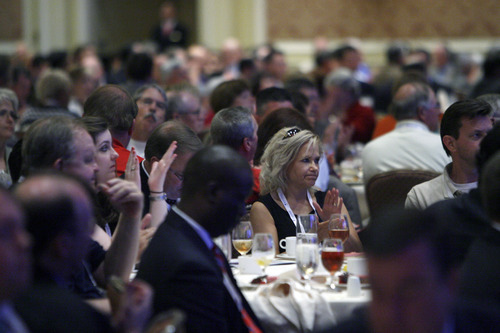This is an archived article that was published on sltrib.com in 2012, and information in the article may be outdated. It is provided only for personal research purposes and may not be reprinted.
The American Legislative Exchange Council has found itself in the crosshairs of a national campaign from critics, but lawmakers attending the annual conference in Salt Lake City this week say they won't be intimidated by threats from liberal groups.
"I know you're being attacked by a lot of these leftist groups in your states. I know you are," Ron Scheberle, ALEC's executive director told lawmakers during lunch Wednesday before turning to the group's corporate sponsors. "Thank you. Thank you for standing with us. I know you've been attacked a lot — extortion threats and letters. But those who are here today are standing strong."
Twenty-five corporate sponsors have abandoned ALEC in recent months amid the public scrutiny, fueled by groups like Common Cause, the Center for Media and Democracy and others.
"Through ALEC, corporate lobbyists actually sit behind closed doors … and vote as equals with our elected representatives on model bills that change our rights," Lisa Graves of the Center for Media and Democracy told a group of about 120 ALEC opponents gathered Wednesday.
—
Critics • Alliance For A Better Utah and others issued a report identifying 17 bills that were in many cases taken verbatim from the ALEC model legislation on topics and relying on ALEC ideas or principles on numerous other occasions.
The groups contend Utah is the "crown jewel" for ALEC legislation, seeking to erode public education, undermining organized labor, and benefiting corporations over the public interest.
"ALEC is the poster child for non-transparent political infrastructure that puts corporate profits ahead of the public interest," said Common Cause President and CEO Bob Edgar, a former Democratic congressman from Pennsylvania. "ALEC represents a pay-to-play system at its worst, a system where the most powerful corporations buy their way in."
Rep. Steve McDaniel, deputy speaker of the Tennessee House of Representatives and a member of ALEC since 1989, said the businesses that dropped their sponsorship of ALEC "caved in to pressure," but legislators and ALEC supporters won't be bullied.
"I don't think the liberal elements of this country are going to deter us as members of the legislatures, and most corporations are going to embrace these values that made this country great," McDaniel said.
About a half-dozen protesters carrying signs chanted outside the Grand America Hotel, where the conference was being held. It was a smaller demonstration than greeted ALEC members when the convention was held in Arizona, according to several people who attended both. There also appeared to be fewer legislators at the Salt Lake City conference.
—
Conference business • Inside the hotel Wednesday, legislators and private-sector members met in a series of subcommittees to discuss and refine ALEC's model legislation. Afternoon sessions looked at how to curb frivolous lawsuits and control Medicaid costs.
In one session, Imagine Learning, a Provo-based company that makes educational software that Utah schools have bought to help non-English speakers, boasted of the success of its software in teaching special-needs students.
Sessions Thursday include "Can Tobacco Cure Smoking?" and a forum on pension reform.
Outside the meetings organizations like the National Rifle Association, the National Right To Life Committee, National Right To Work, Family Research Council, the Entertainment Software Association and Americans For Tax Reform pitched their agendas to lawmakers. More than four dozen booths were set up to advocate for their particular education reform, energy policy and various tax initiatives.
Gov. Gary Herbert, who welcomed lawmakers to the conference, touted Utah's limited-government accomplishments, which landed the state the top spot in ALEC's annual ranking.
He also used the opportunity to pitch the nation's legislators on Utah's campaign to put more federal land under state control.
A bill signed earlier this year by Herbert — demanding that the Congress cede about 30 million acres of federal land to the state and threatening litigation if it does not — was adopted by ALEC as model legislation last year, but it has not passed anywhere else.
"I think anything that gets people to come together and talk about issues is a healthy thing, and the private sector is a part of that," said Herbert. "I like openness and transparency and as they hash out issues back and forth, it has to go back to the Legislature … so I think there's more politics to that criticism than reality."
—
Special interests • Herbert's Democratic challenger, Peter Cooke, criticized ALEC as a secretive group and asked, "Why would Governor Herbert choose to address this organization?
"[ALEC is] an organization with a reputation for connecting wealthy corporations with state legislators for the purpose of writing bills favorable to those corporate special interests," Cooke said. "Instead of a government 'of the people, by the people and for the people,' we see too many instances where monied interests have far too much power and influence in shaping the laws that govern us."
New Mexico State Rep. Paul Bandy said he has been a member of ALEC for six years and sees the group in a positive light, since it advances market principles that help create jobs and benefit everyone.
"The reason we've been attacked by groups like Common Cause [and others] is because ALEC has been working effectively" at advancing free-market policies, said Bandy. "When you talk about ALEC now, people know what you're talking about."
ALEC disbanded its Public Safety and Elections Task Force earlier this year. That group produced some of ALEC's most controversial model bills, including voter identification legislation and a "stand-your-ground" law, backed by the NRA, which drew national attention after the fatal shooting of Florida teenager Trayvon Martin.
"Something positive has come out of this [attention] in that ALEC hasn't changed its mission at all," said Utah Sen. Curt Bramble, R-Provo, who is on the ALEC Board of Directors. "It's just re-emphasized what its mission is, that is free markets, limited government and federalism."
Brian Walsh, executive director of the American Religious Freedom Program at the Ethics and Public Policy Center, said he hasn't seen his group affected by ALEC's pivot back to an economic focus.
"We don't actually see religious liberty as being a social issue because in some ways its more foundation for all of our issues," Walsh said. "It's not like they're trying to shove people out. … They're still welcome and the legislators here still want to hear from them."
Lee Davidson contributed to this report


